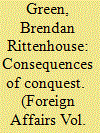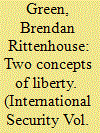|
|
|
Sort Order |
|
|
|
Items / Page
|
|
|
|
|
|
|
| Srl | Item |
| 1 |
ID:
170592


|
|
|
|
|
| Summary/Abstract |
International political outcomes are deeply shaped by the balance of power, but some military capabilities rely on secrecy to be effective. These “clandestine capabilities” pose problems for converting military advantages into political gains. If clandestine capabilities are revealed, adversaries may be able to take steps that attenuate the advantages they are supposed to provide. On the other hand, if these capabilities are not revealed, then adversaries will be unaware of, and unimpressed by, the real balance of power. Most of the existing literature emphasizes that states have few incentives to signal their clandestine capabilities. This conclusion deserves qualification: the condition of long-term peacetime competition can make signaling a profitable decision. Within this context, two important variables help determine whether a state will signal or conceal its secret capabilities: the uniqueness of the capability and the anticipated responsiveness of the adversary. An extended case study of Cold War strategic antisubmarine warfare confirms these predictions.
|
|
|
|
|
|
|
|
|
|
|
|
|
|
|
|
| 2 |
ID:
186924


|
|
|
| 3 |
ID:
137242


|
|
|
|
|
| Summary/Abstract |
Secure second strike nuclear forces are frequently held to be easy to procure. Analysts have long argued that targeting intelligence against relocatable targets like submarine launched and land mobile ballistic missiles is difficult to obtain. However, the scholarly consensus on intelligence for counterforce operations is seriously overdrawn. Both during and after the Cold War, the United States developed substantial intelligence capabilities to track and target submarines and mobile missiles. These efforts achieved important and under-appreciated success. Second strike forces have been far more vulnerable than most analysts are willing to credit.
|
|
|
|
|
|
|
|
|
|
|
|
|
|
|
|
| 4 |
ID:
186756


|
|
|
|
|
| Summary/Abstract |
The military implications of Chinese control of Taiwan are understudied. Chinese control of Taiwan would likely improve the military balance in China's favor because of reunification's positive impact on Chinese submarine warfare and ocean surveillance capabilities. Basing Chinese submarine warfare assets on Taiwan would increase the vulnerability of U.S. surface forces to attack during a crisis, reduce the attrition rate of Chinese submarines during a war, and likely increase the number of submarine attack opportunities against U.S. surface combatants. Furthermore, placing hydrophone arrays off Taiwan's coasts for ocean surveillance would forge a critical missing link in China's kill chain for long-range attacks. This outcome could push the United States toward anti-satellite warfare that it might otherwise avoid, or it could force the U.S. Navy into narrower parts of the Philippine Sea. Finally, over the long term, if China were to develop a large fleet of truly quiet nuclear attack submarines and ballistic missile submarines, basing them on Taiwan would provide it with additional advantages. Specifically, such basing would enable China to both threaten Northeast Asian sea lanes of communication and strengthen its sea-based nuclear deterrent in ways that it is otherwise unlikely to be able to do. These findings have important implications for U.S. operational planning, policy, and grand strategy.
|
|
|
|
|
|
|
|
|
|
|
|
|
|
|
|
| 5 |
ID:
115343


|
|
|
|
|
| Publication |
2012.
|
| Summary/Abstract |
Contrary to conventional accounts, the United States did not immediately adopt a set of sweeping commitments to Europe after World War II. Instead, it pursued a buck-passing strategy until the early 1960s that sought to craft Western Europe into an independent pole of power capable of balancing the Soviet Union largely without the assistance of the United States, thereby facilitating the withdrawal of U.S. troops from the continent. Only under President John F. Kennedy did the United States adopt a balancing strategy, making permanent forward commitments to the defense of Europe. A new theory of liberal ideas and foreign policy explains this shift. "Negative liberals," who see freedom in terms of opportunity and minimal state intervention, adopted a buck-passing strategy to pass the costs of foreign policy to other actors and minimize state intrusion at home. "Positive liberals," who see freedom as the exercise of capabilities and often welcome state intervention, had no such compunctions. Starting with Kennedy, positive liberals welcomed firmer balancing commitments in part as a measure to protect the liberal regimes that had emerged in Western Europe after World War II.
|
|
|
|
|
|
|
|
|
|
|
|
|
|
|
|
|
|
|
|
|